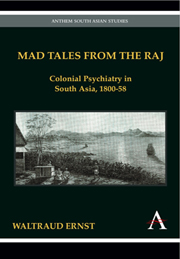Book contents
- Frontmatter
- Contents
- List of Illustrations
- Preface
- Chapter 1 Introduction: Colonizing the Mind
- Chapter 2 Madness and the Politics of Colonial Rule
- Chapter 3 The Institutions
- Chapter 4 The Medical Profession
- Chapter 5 The Patients
- Chapter 6 Medical Theories and Practices
- Chapter 7 Conclusion: ‘Mad Dogs and Englishmen…’
- Primary Sources
- Notes
- Index
Chapter 7 - Conclusion: ‘Mad Dogs and Englishmen…’
Published online by Cambridge University Press: 05 March 2012
- Frontmatter
- Contents
- List of Illustrations
- Preface
- Chapter 1 Introduction: Colonizing the Mind
- Chapter 2 Madness and the Politics of Colonial Rule
- Chapter 3 The Institutions
- Chapter 4 The Medical Profession
- Chapter 5 The Patients
- Chapter 6 Medical Theories and Practices
- Chapter 7 Conclusion: ‘Mad Dogs and Englishmen…’
- Primary Sources
- Notes
- Index
Summary
In tropical climes there are certain times of day
When all the citizens retire, to tear their clothes off and perspire.
It's one of those rules that the biggest fools obey,
Because the sun is much too sultry and one must avoid its ultry-violet ray —
Papalaka-papalaka-papalaka-boo. (Repeat)
Digariga-digariga-digariga-doo. (Repeat)
The natives grieve when the white men leave their huts,
Because they're obviously, absolutely nuts —
Noel CowardIn the preface to his famous Folie et Déraison Michel Foucault suggests:
To write a history of madness would mean to produce a structural study of the historical whole – notions, institutions, legal and police measures, scientific concepts – that imprison a madness that can never be restituted to its natural state.’
No such total analysis in the structuralist sense has been attempted here. Nevertheless, the aim has been to reconstruct the history of madness among those treated by the British during ‘John Company's ’ time as completely as surviving sources allow. The treatment of the European and Indian mentally ill in British institutions has been analyzed in relation to colonial ideology, state policy and legislation; the important role of public opinion ‘at home’ and in the colony in the construction of treatment methods and administrative control measures has been highlighted; and the reconcilability of commercial interests, colonial ideology and humanitarian motives has been discussed.
Further, the comparatively early and successful intervention by the colonial state in the ‘lunacy sector’ has been related to the persistent endeavour of Company officials and of the expatriate community more generally to preserve the image of the European elite as formidable and impeccable colonial rulers.
- Type
- Chapter
- Information
- Mad Tales from the RajColonial Psychiatry in South Asia, 1800–58, pp. 125 - 132Publisher: Anthem PressPrint publication year: 2010



